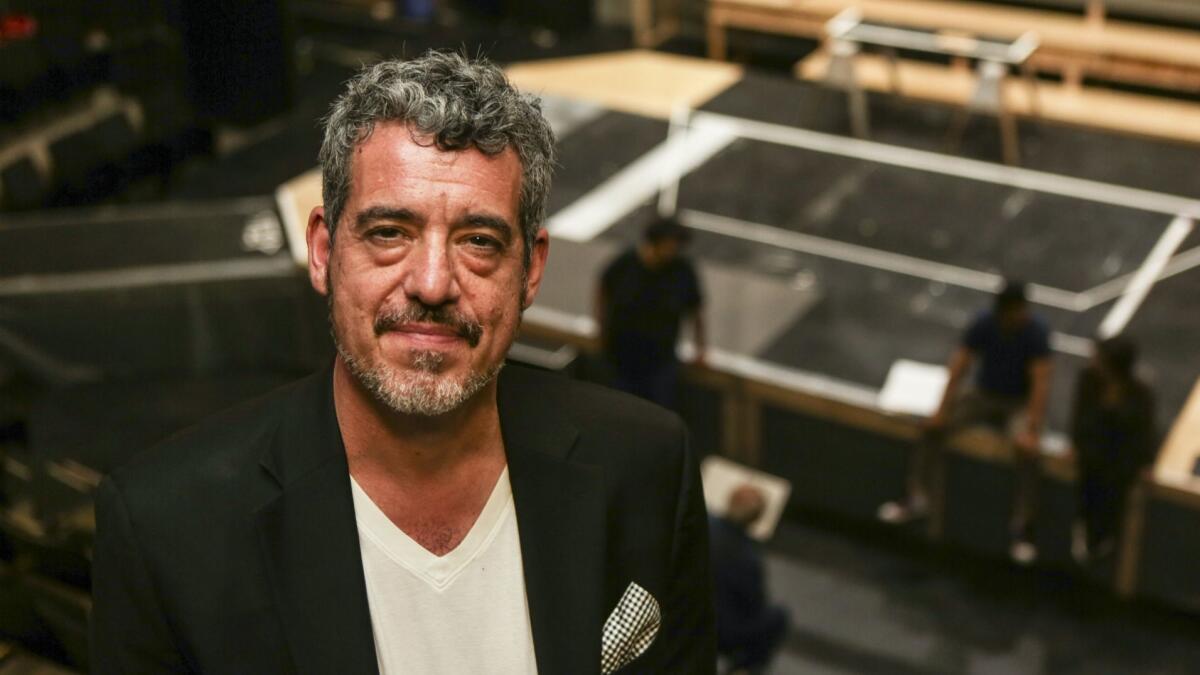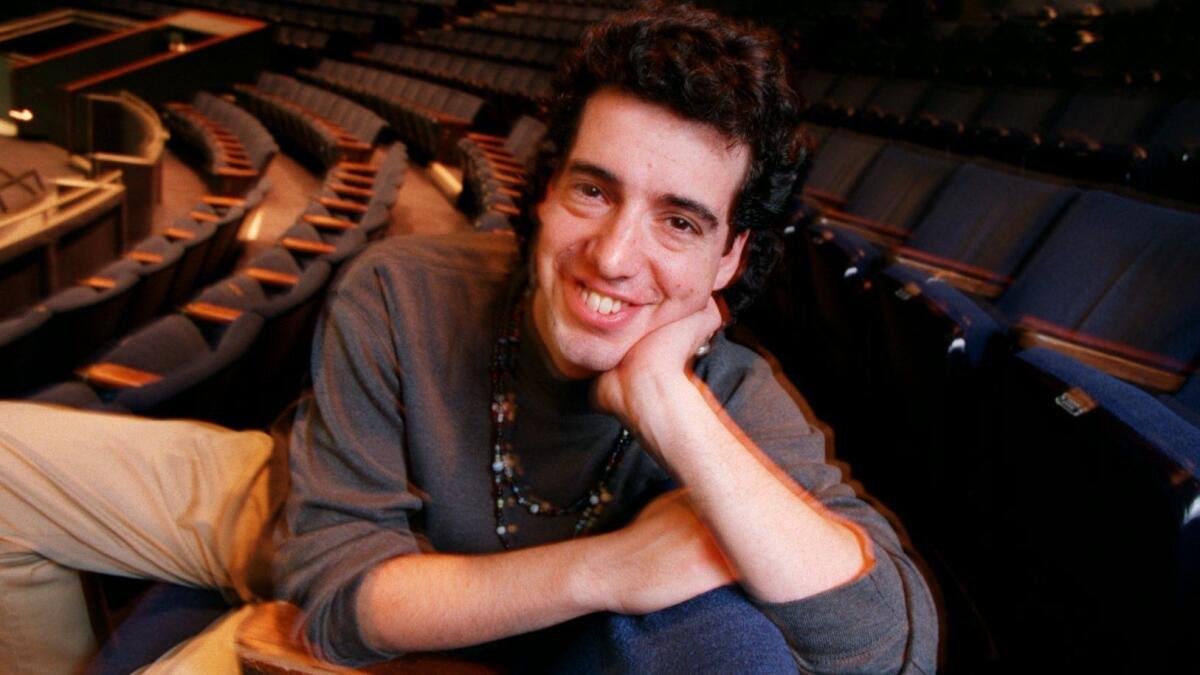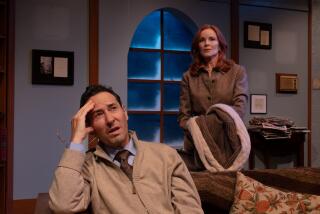Oliver Mayer returns to the boxing ring with his new play, ‘Members Only’

Oliver Mayer has tried the way of the fighter and the way of the artist.
He stuck with the latter, becoming a playwright, but the boxing ring continues to inspire him, providing the backdrop to his best-known play, “Blade to the Heat,” as well as a sequel, “Members Only,” that begins previews Thursday for a Saturday opening as a Latino Theater Company production at the Los Angeles Theatre Center.
Mayer, who grew up in Studio City, took on all sparring partners while studying boxing in his early teens. “I had a lot of experience, as a young person, with other men, and it completely affected the way that I acted around men, so that when I became a writer it was only natural that I would think about the fights when I thought about how people treat each other.”
Pedro Quinn, the central character in both plays, doesn’t fit expectations in the hyper-macho world of boxing. He trains hard and fights smart — he’s tough as can be — but he’s soulful in a way that other men distrust.
Racially, he’s also stranded.
He’s Mexican and Irish — visibly Latino, but he doesn’t speak Spanish and doesn’t gravitate strongly to either ethnicity. “He feels as if he can’t really join one tribe or another,” says Mayer, who is the son of an Eastern European Jewish father and Mexican American mother.
Yet the boxer gets categorized nevertheless. Both plays are populated with Latino and black characters for whom every day is a fight against a rigged system.
Onto these issues Mayer layers history — how America and its perceptions have changed. Or haven’t. “Blade” takes place in 1959-60, “Members” in 1982. Quinn ages from early 20s to mid-40s, much as Mayer has from 29 at the time of the first play’s introduction to 53 now.
“I thought that Quinn potentially could help me understand being alive in these years and the choices I’ve made, and some of my friends have made, in order to survive, in order to be happy enough to keep waking up,” Mayer says.
That is why he has returned to the story introduced in 1994 by New York’s Public Theater, directed by its then-artistic director, George C. Wolfe, and staged in L.A. a year and a half later at the Mark Taper Forum with Ron Link directing. “Members Only” is the middle segment in what Mayer now envisions as a trilogy.
Jose Luis Valenzuela, the Latino Theater Company’s artistic director, admires Mayer’s ability to go the distance. He searches deep into character and story, says Valenzuela, who is directing “Members Only,” and challenges theatergoers to do the same. “He doesn’t say everything straightforward; there is always something underneath the text that’s unexpected.”
Mayer is trim, his face chiseled in long, strong lines. He doesn’t box anymore. Exercise these days is walking, either across the campus at USC, where he is an associate professor in the university’s powerhouse playwriting program, or with Don Aldo, the pooch indulging in an afternoon lie-down near Mayer’s seat at the dining table in his Baldwin Village apartment. His wife, actress-director Marlene Forte, is off visiting a niece. Forte has appeared in or directed several of his plays and has a key role in “Members Only.”
“Probably my very first memory,” Mayer says, “from whatever crib I was in, is of looking out and seeing my father in the blue light of the television, watching boxing at the Olympic Auditorium.”
His late father, Alexander A. Mayer, was an art director with Universal Studios for more than two decades, working mostly in TV. He had boxed while in the Navy. Mom, Gloria, worked in nursing administration.
In addition to the rumble of the ring, the home was often filled with music, and young Oliver was taken to see plays. “I was a particularly nonviolent child,” Mayer says. “My mother was in charge of bringing me up. I listened to Bach and I smelled potpourri and I was soft. Around fifth grade, sixth grade, it got to be a problem and kids started to bully me, beat up on me.”
Dad’s advice was the same as many fathers’: Hit back. Young Oliver did, but the taunting and fighting continued into middle school. Eventually, he realized he needed more than a schoolyard education, so on the cusp of his teens he pulled out the Yellow Pages and called a boxing gym. From age 13 to about 16½, he headed there at least once a week, often more, for coaching.
He quickly learned new ways of reading people. “In school, I could begin to tell that people might say one thing and do another,” but “the great thing about the fights,” he says, is: “who you are is what you’ve got.”
This is a central theme in Mayer’s “Blade” plays, and it presents a conundrum to their lead character, who gets punched around by society’s duplicity and double standards even as he triumphs in the more direct world of the ring.
In “Blade to the Heat,” young Quinn is beset by a vast whisper campaign about his sexuality, then, during a title fight, openly taunted in the ring. He lashes out in blind fury, fatally injuring his opponent.
In “Members Only,” the 40-something Quinn is more comfortable with himself, but he can escape neither his guilt over the death nor the discrimination that propelled it. The story’s characters of color are still treated as outsiders, and those who are also gay face hostility over their increased visibility. The emergence of AIDS introduces another level of toxicity.
“Twenty years gave a man of color so many more options,” Mayer says. “But all those options don’t necessarily protect you from the scourge, which in this case is a disease that doesn’t even have a name yet, or the cruelty, the animosity of individuals.”
The impulse to expand into a trilogy didn’t arise until about a decade ago. Mayer notes that on the rare occasions when strangers introduce themselves to him, it’s because of “Blade to the Heat.” “People would tell me what it meant to them, and I thought, well, maybe there’s something still to say.”
The third play is still just a swirl of ideas, but he says he might advance the story into the early 21st century, with Quinn stepping forward as more of a role model and a new character in “Members,” a female boxer named Lone, emerging as a figure of resilience.

Mayer studied English and vocal music at Cornell, got hooked on writing plays during a junior year abroad at the University of Oxford, then earned a master of fine arts in playwriting from Columbia University.
Los Angeles has been a steady consumer of his work, dating back to 1992 and the Los Angeles Theatre Center’s production of “Joe Louis Blues.” The city’s small theaters have proved especially hospitable: the Black Dahlia (“Ragged Time”), Casa 0101 (“Young Valiant”), Company of Angels (“Dias y Flores,” “The Wiggle Room”), Playwrights’ Arena (“Conjunto,” “Laws of Sympathy”) and Urban Theatre Movement (“Yerma in the Desert”).
He has taught for nearly two decades, first at Art Center College of Design and now for 15 years at USC.
“I’m very hopeful that it makes me walk the talk,” he says. “Every week I am making my students go through reads of their work,” so “I then go back to my desk and do it myself. And I have to stay a couple of steps ahead of them so I have more than the same lesson to give them every week.”
One of his students in the middle 2010s was Inda Craig-Galván, whose “I Go Somewhere Else” was recently introduced by Playwrights’ Arena and whose “Black Super Hero Magic Mama” is scheduled at the Geffen in the spring. “He would get quite excited when we would push our limits,” she recalls, or “when things would start to get dangerous. As a writer himself that’s a reminder to keep pushing in that direction in his own work.”
Mayer’s students now teach him, much as his sparring partners once did.
“The choices you make and their consequences, the action-reaction of it all, is gigantic in the ring, and by extension in the way that I do art,” Mayer says.
It’s a bit like chess, a game in which one must always think ahead.
“Thirty years of writing plays has allowed me the opportunity to play chess a little bit the way that I might have if I’d stayed fighting.”
♦ ♦ ♦ ♦ ♦ ♦ ♦ ♦ ♦ ♦ ♦
‘Members Only’
Where: Los Angeles Theatre Center, 514 S. Spring St., downtown L.A.
When: Previews begin Oct. 25; opens Oct. 27. 8 p.m. Thursdays-Saturdays, 3 p.m. Sundays, some variations; ends Nov. 18
Tickets: $24-$64
Info: (866) 811-4111, thelatc.org
Twitter: @darylhmiller
More to Read
The biggest entertainment stories
Get our big stories about Hollywood, film, television, music, arts, culture and more right in your inbox as soon as they publish.
You may occasionally receive promotional content from the Los Angeles Times.











